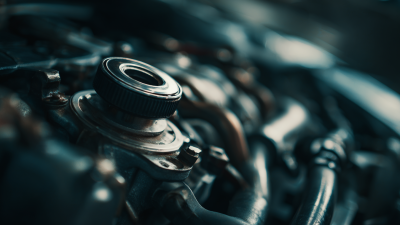Leave Your Message
-
Phone
-
E-mail
-
WhatsApp
In the automotive industry, the distinction between genuine parts and aftermarket alternatives is crucial for ensuring optimal vehicle performance. According to John Smith, a leading expert in automotive engineering, “Using genuine parts is not just about compliance; it’s about safety and reliability.” This perspective underscores the essence of integrating high-quality components essential for maintaining a vehicle’s integrity. Genuine parts are meticulously designed and manufactured to meet the original specifications set forth by the vehicle's manufacturer.
Incorporating genuine parts enhances not only the performance of the vehicle but also prolongs its lifespan. When manufacturers produce vehicles, they rigorously test their components to ensure they perform under various conditions. Genuine parts maintain these same high standards, enabling drivers to experience superior mechanical efficiency and reduced risks associated with vehicle malfunctions. In a sector where performance and reliability are of paramount importance, genuine parts emerge as the cornerstone of maintaining vehicles in peak condition.
As we delve into the "Top 5" reasons why genuine parts are imperative for vehicle performance, it becomes clear that investing in quality is an investment in safety, dependability, and the overall longevity of your vehicle. The expert insights on this subject further bolster the understanding that choosing genuine parts is an informed and essential decision for every vehicle owner.

Genuine parts play a crucial role in the maintenance of vehicle performance. Unlike aftermarket alternatives, genuine parts are specifically designed and manufactured to meet the exact specifications of the original equipment. This ensures that they fit perfectly and function effectively, maintaining the integrity of the vehicle's systems. By using genuine parts, drivers can prevent issues that may arise from incompatibility or inferior quality, such as decreased fuel efficiency, increased emissions, or even mechanical failures.
Moreover, genuine parts contribute to the longevity and reliability of a vehicle. They are subjected to rigorous testing and quality assurance, which means they are built to withstand the demands of daily use. Regular maintenance with genuine parts not only preserves the performance of key components but also enhances the overall driving experience. By choosing genuine parts for repairs and replacements, vehicle owners can enjoy improved safety, better fuel economy, and consistent performance over time.
Using genuine parts significantly enhances vehicle performance, including engine power, fuel efficiency, and overall longevity, compared to aftermarket alternatives.
When it comes to maintaining optimal vehicle performance, distinguishing between genuine parts and imitation components is crucial. Genuine parts, often manufactured by the original equipment manufacturer (OEM), are designed specifically for your vehicle's make and model. According to a study by the Automotive Aftermarket Industry Association (AAIA), vehicles that utilize genuine parts can experience up to 25% better performance over their lifespan compared to those fitted with imitation parts.
Tips for identifying genuine parts include checking the packaging for OEM labels, ensuring compatibility with your vehicle's VIN, and purchasing from authorized dealers or trusted retailers. Imitation components might seem like a cost-effective alternative, but they often lack the quality and durability of genuine parts, leading to potential long-term issues and increased repair costs.
Additionally, consider that using genuine parts can also contribute to improved resale value, as noted in a report from Kelley Blue Book, which states that vehicles with documented service history using OEM parts retain value better in the market. Always prioritize genuine parts over imitations to ensure your vehicle remains in peak condition and to avoid unnecessary expenses down the line.
| Part Type | Genuine Part Benefits | Imitation Component Risks | Performance Impact |
|---|---|---|---|
| Brake Pads | Improved safety, better stopping power | Higher wear rate, reduced effectiveness | Critical, can lead to accidents |
| Oil Filters | Superior filtration, longer engine life | Poor filtration, potential engine damage | High, can lead to engine failure |
| Spark Plugs | Enhanced ignition, better fuel efficiency | Misfiring, reduced power | Significant, affects overall performance |
| Timing Belts | Reliability, minimizes chances of belt failure | Potential for breakage, major engine damage | Critical, can lead to catastrophic engine failure |
| Air Filters | Improved airflow, better acceleration | Reduced airflow, poor performance | Moderate, affects efficiency |
When sourcing genuine parts, it's essential to align procurement strategies with industry best practices to ensure optimal vehicle functionality. The global spare parts logistics market is expected to grow significantly, from $12.66 billion in 2025 to $18.77 billion by 2032, indicating a CAGR of 5.8%. This growth highlights the increasing demand for authentic components that ensure vehicles perform at their best. Utilizing advanced tools such as software ‘should costing’ can act as a game changer for automotive companies by enabling them to analyze costs more effectively, ultimately reducing expenditures on automotive software by up to 30%.
Effective supply chain management plays a crucial role in the success of sourcing initiatives. By optimizing the supply chain from raw materials to the end consumer, companies can significantly lower costs while enhancing efficiency. A comprehensive reassessment of capital expenditures during every project phase not only minimizes costs and timelines but also maximizes returns. Incorporating analytics-based cost algorithms facilitates better decision-making in procurement, ensuring that automotive manufacturers can maintain high performance standards and deliver quality vehicles to the market.
Regular maintenance is essential for ensuring that genuine parts operate at their best. One key aspect of this is adhering to a consistent maintenance schedule, which includes routine checks and timely replacements of parts. For instance, oil changes should follow the recommendations outlined in the owner's manual, as this not only maintains the engine's health but also prolongs the life of genuine parts. Furthermore, regularly inspecting the brakes, tires, and suspension components can help identify wear and tear before it becomes a significant issue, ensuring that your vehicle performs optimally.
Additionally, using proper cleaning products and methods tailored for specific parts can enhance their performance. Keeping the air filters clean allows for better engine breathing, while using the right fluids significantly impacts braking and steering systems. It’s also vital to keep up with software updates for modern vehicles, as these can optimize performance and efficiency. By diligently maintaining genuine parts, vehicle owners can not only enhance performance but also safeguard their investment and ensure safety on the road.
Using genuine parts in your vehicle is not just a matter of brand loyalty; it has significant long-term benefits for both lifespan and efficiency. According to a report from the Automotive Aftermarket Industry Association (AAIA), vehicles that utilize genuine parts can last up to 30% longer than those that use aftermarket components. Genuine parts are specifically designed for your vehicle's make and model, ensuring seamless fit and optimal performance, which ultimately translates into better fuel efficiency and a lower risk of costly repairs.
Incorporating genuine parts can also have a positive impact on your vehicle's resale value. The National Automobile Dealers Association (NADA) indicates that vehicles maintained with OEM parts typically fetch 10-20% higher prices in the used car market. Additionally, genuine parts come with manufacturer warranties that can cover future repairs, assuring you of their reliability and quality.
Tips: Always keep your vehicle's service history organized; this documentation can significantly bolster your vehicle’s resale value. When replacing parts, ask your mechanic about the differences between OEM and aftermarket options—this knowledge can save you money and time in the long run. Lastly, perform regular maintenance to ensure that any installed genuine parts function optimally, contributing to overall vehicle efficiency.






